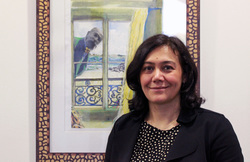Shirin Naef (Zürich/Bonn): Bioethics and religious law. The principle of doing good deed and its applications in contemporary reproductive practices
Abstract
In her lecture, Shirin Naef will explore the merit of a “good deed” in the contexts of modern genetic and reproductive technologies from the perspective of Shia Islamic jurisprudence (fiqh) and ethics. She will likewise reiterate its importance in the field of bioethical issues and practice, particularly with regard to the use of human bodily and genetic materials, and the impact such new technical variables have on our contemporary understanding of family structures and practices. The rapid developments that have occurred in the medical and biotechnology fields have not only faciliateded great accomplishments in healthcare and treatment, but also brought forth challenges and different moral contradictions that have stirred controversies in bioethics. One of the main ethical challenges focuses on the commodification of body parts and persons.
Based on these findings, Shirin Naef will present a Shia Islamic perspective to try to tackle these ethical challenges by drawing on concepts such as “remuneration” and “reward”, and emphasizing the importance of the act of charitable giving itself. From a theoretical point of view, she will aim to contribute to the global bioethical discourse by providing some legal and moral principles and ideas in the tradition of Islamic jurisprudence and ethics and their contemporary reception. The lecture will draw on extensive ethnographic research on the regulation and implementation of reproductive technologies in Iran, combined with ongoing textual analysis and mapping of legal and theological debates and positions taken by religious authorities and legal experts.
Dr. Shirin Naef
Curriculum Vitae
Dr. Shirin Naef ist Anthropologin und arbeitet hauptsächlich im interdisziplinären Bereich zwischen Recht, Religion und Ethik, mit besonderem Fokus auf den persischsprachigen Kulturraum. Sie studierte Theater und Englische Sprache in Teheran und von 2002 bis 2008 Anthropologie, Islamwissenschaft und Linguistik an der Universität Bern, Schweiz. Von 2009 bis 2012 war sie DFG-Stipendiatin und Mitglied des Graduiertenkollegs Bioethik am Internationalen Zentrum für Ethik in den Wissenschaften (IZEW) der Universität Tübingen. Zusätzlich trat sie 2011 ein Fellowship an der School of Social Anthropology der Universität Manchester an und war 2015 als Gastforscherin an der Brocher Foundation in Genf tätig. 2017 wurde Shirin Naef mit ihrer Dissertation „Kinship, Law and Religion: An Anthropological Study of Assisted Reproductive Technologies in Iran“ an der Philosophischen Fakultät der Universität Zürich promoviert, wo sie aktuell als Assoziierte Wissenschaftlerin am Institut für Sozialanthropologie und Empirische Kulturwissenschaft (ISEK) tätig ist.
Dr. Naefs Forschungsschwerpunkte sind Schiitischer Islam und Jurisprudenz (fiqh), Bioethik, Theologie in vergleichender Perspektive, materielle Kultur sowie Wissenschaftsgeschichte. Darüber hinaus beschäftigt sich Dr. Naef mit der Reproduktionsmedizin, Verwandtschaft und Sexualität und forscht seit 2017 über die Themen Philanthropie, Gemeinnützigkeit, Moral und Ökonomie.
Seit Oktober 2018 ist Dr. Shirin Naef Fellow am Käte Hamburger Kolleg „Recht als Kultur“.





